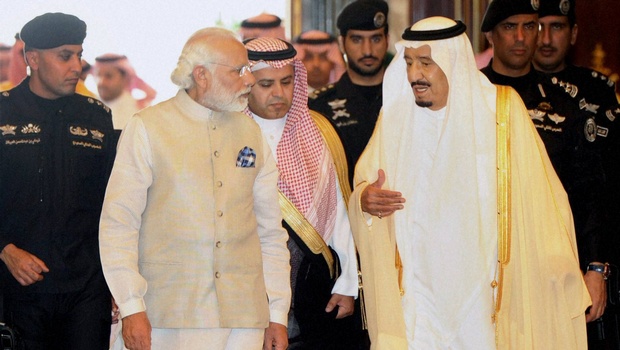India sought to revitalise ties and deepen cooperation with key Gulf partner Saudi Arabia. Prime Minister Narendra Modi discussed investment options and ways to deepen collaboration in counter-terrorism with Saudi King Salman bin Abdulaziz Al Saud. This came even as Indian officials were preparing for a visit by oil minister Dharmendra Pradhan to Saudi Arabia’s regional rival Shia majority Iran in what appears to be a diplomatic tightrope walk by India between the two. (livemint.com)
Modi, who arrived in Riyadh last week, witnessed the signing of five pacts between India and Saudi Arabia after talks with King Salman. Significant among them was one between the Financial Intelligence Unit of India and its Saudi counterpart on cooperation in the exchange of information on money laundering, terrorism financing and related crimes and another on investment promotion.
A joint statement issued at the end of the two-day visit said Modi and King Salman “expressed strong condemnation of the phenomenon of terrorism in all its forms and manifestations, irrespective of who the perpetrators were and of their motivations.”
The two countries agreed that the “menace of extremism and terrorism threatens all nations and societies,” and “the two leaders rejected totally any attempt to link this universal phenomenon to any particular race, religion or culture,” the statement said.
“They called on all states to reject the use of terrorism against other countries; dismantle terrorism infrastructures where they happen to exist and to cut off any kind of support and financing to the terrorists operating and perpetrating terrorism from their territories against other states; and bring perpetrators of acts of terrorism to justice. “The two leaders agreed to further strengthen cooperation in combating terrorism, both at the bilateral level and within the multilateral system of the UN. The two leaders called upon the international community to strengthen multilateral regimes to effectively address the challenges posed by terrorism. The two sides agreed to work together towards the adoption of India’s proposed Comprehensive Convention on International Terrorism in the United Nations. The Prime Minister lauded Kingdom’s efforts at fighting terrorism in all its aspects and its active participation in international efforts towards this end,” it said in a reference to an effort by Saudi Arabia in December to forge a coalition of 34 nations against the rise of the Islamic State (IS).”
Former foreign secretary Kanwal Sibal described the references to terrorism as “good” but noted that there was no mention of cross-border terrorism that India was concerned about vis-a-vis Pakistan. “This is positive but there was no reference to cross-border terrorism, something that could have pointed a finger at Pakistan,” Sibal said.
Saudi Arabia is seen as a close ally and partner of Pakistan that India accuses of fomenting and supporting an Islamist insurgency in Kashmir, the region that both South Asian countries claim but administer in parts. But cooperation between India and Saudi Arabia on counter-terrorism issues has shown an increase, with Saudi Arabia handing over key terror suspects wanted by India in 2012, 2015 and 2016, according to Indian officials.
The joint statement said that Modi invited Saudi Arabia to be a “partner in India’s growth story,” and encouraged investments in the infrastructure sector. “The Saudi side expressed its interest in investing in infrastructure development in India, especially in priority areas such as railways, roads, ports, and shipping,” the statement said.
Before sitting down for talks with the Saudi monarch, Modi met Saudi business representatives and promised a relaxed business environment with a stable tax regime. The controversial retrospective tax, introduced in 2012 that had unnerved foreign investors, Modi assured, was a thing of the past.
“Now, retrospective tax in India has become a thing of past. It will not happen going ahead,” Modi said. “If someone plans to come to India after 10 years, he should be able to predict the tax structure. So I’m in favour of a long-term predictable tax system and we have implemented it,” he said.
Inviting Saudi businesses to invest in railways, defence and energy, Modi said the Goods and Services Tax or GST, which aims to remove barriers across states and unite the country into a common market, would be in place soon.
“You are worried about GST. Do not worry about GST. GST will happen. I cannot give a timeframe, but it will happen. It was our commitment, and it is about to happen,” Modi said. “Saudi investment in fertilisers, warehousing, cold chain facilities and agriculture would be a win-win partnership as it would ensure good quality food products for Saudi Arabia,” he said.
Modi’s visit to Saudi Arabia is the second to a major Gulf country. In August, he visited the United Arab Emirates (UAE). India has more than 7 million expatriates working in the Gulf region, sending back foreign remittance. Among the Gulf countries, Saudi Arabia is India’s largest supplier of oil and the fourth largest trading partner. Modi’s visit to the Gulf country comes at a time of flux in the region not least due to the rise of the terrorist Islamic State (IS) group in parts of Iraq and Syria.
India is currently working out a visit by oil minister Pradhan to Tehran this month, with India keen to get development rights for the Farzad-B gas field, where an Indian consortium of ONGC Videsh, Indian Oil Corp. and Oil India Ltd has discovered oil. “India has to maintain a close relationship with Iran and Saudi Arabia. But there is no need for India to get involved in their conflict,” Sibal said.


